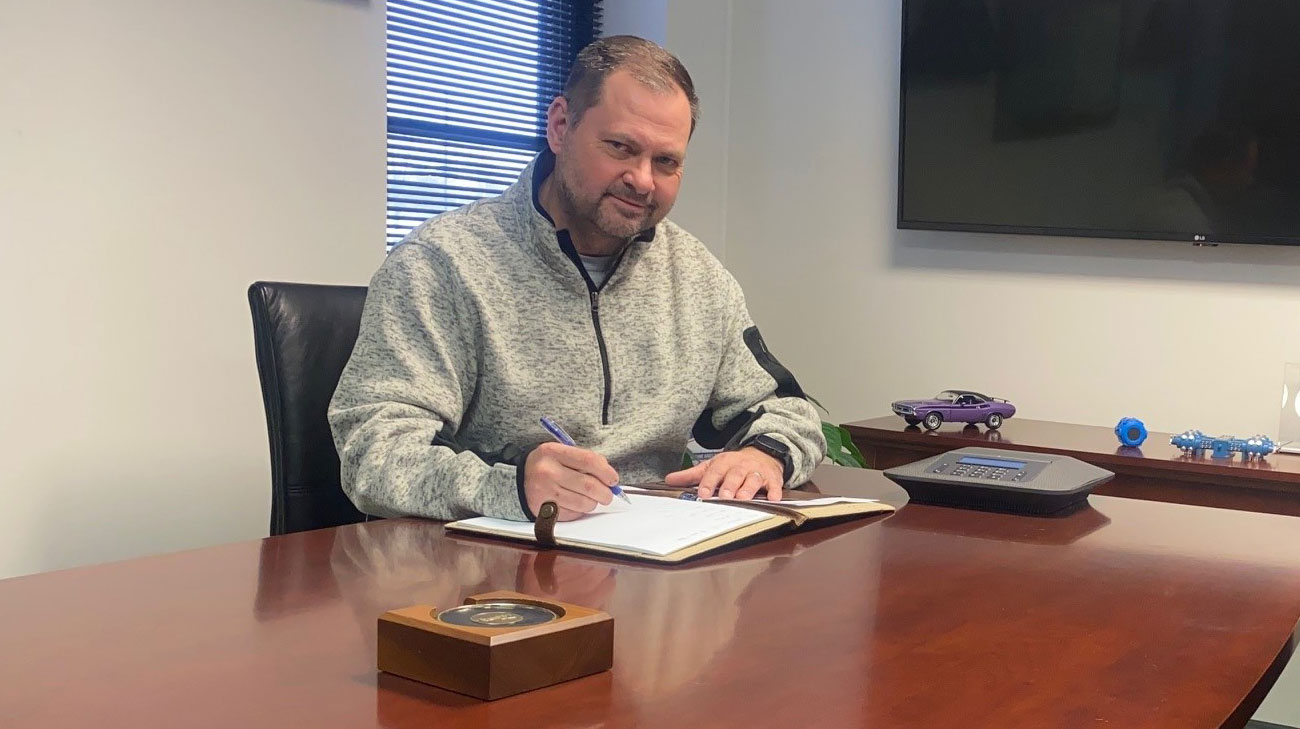
Jay McCoy of Johnstown, Ohio, received a comprehensive annual physical health examination thanks to his participation in Cleveland Clinic’s Executive Health Program.
Designed to target and identify health risks and offer recommendations for successful health management, executives whose companies participate in the program come to Cleveland Clinic main campus for a 6- to 8- hour standard physical to:
- Discover potential health problems.
- Target, reduce and eliminate medical risk factors.
- Facilitate prompt, expert and compassionate care for injuries or illness.
- Promote wellness, including nutrition, fitness and stress management.
Once Jay’s physical was scheduled at Cleveland Clinic for May 5, 2022, his wife – a family medicine physician in Johnstown – also scheduled him for a routine colonoscopy.
“I was 48 at the time, and my wife said the American Medical Association had recently changed the recommendations for when to begin routine screenings for colon cancer. Since the latest recommendation was to begin screening at age 45 due to more younger people being diagnosed, she scheduled the colonoscopies for both of us while we were going to be at Cleveland Clinic for my executive physical,” says Jay.
Raul Seballos, MD is an internal medicine physician and enterprise director for the Center for Executive Health Medicine at Cleveland Clinic. One of four full-time executive health physicians, he conducted Jay’s physical including a head-to-toe evaluation; vision, hearing, heart health and lung function tests; urinalysis and comprehensive blood work; weight, fitness and stress evaluation and more.
“At the time of his exam, Mr. McCoy didn’t express any symptoms other than feeling fatigued and losing ten pounds over the past month,” says Dr. Seballos. “Since he has a high stress job and had been trying to lose weight, neither of those were of much concern until his blood work showed iron deficiency anemia.”
Dr. Seballos had observed that Jay looked quite pale. That, combined with his blood work results, could be indicative of two things – an ulcer or internal bleeding. At the end of the physical, Dr. Seballos shared the test results and his opinion with the McCoys. He also requested an upper gastrointestinal endoscopy be done the next day along with the colonoscopy.
The results of the endoscopy were normal, but the colonoscopy showed a mass that was evaluated and diagnosed as stage two colon cancer.
“As soon as I recovered from the anesthesia, I was released and we headed home. Dr. Seballos called while we were driving to share more information and answer questions. He gave us the option of returning to Cleveland Clinic for surgery or providing a surgical consult if I opted to have treatment closer to home,” says McCoy.
Within one month of his diagnosis, Jay had surgery at a hospital just 30 minutes from his home.
Because Cleveland Clinic and the facility where Jay had surgery both use the Epic electronic medical record system, findings and pathologies were easily shared between the two institutions. The other facility even shared their proposed treatment plan with Dr. Seballos so he could follow Jay’s entire course of treatment.
“Here was a guy who if not for his employer, may not have scheduled a colonoscopy on his own,” says Dr. Seballos. “His participation in the Executive Heath program made it convenient for him to be evaluated. He was diagnosed within 24 hours of presentation and had surgery one month later.”
All things bode well for Jay’s future health because the five-year survival rate for colon cancer is much better when it is found and treated early. “His blood loss from the colon cancer was almost microscopic. It would have been found eventually, but because of the executive physical, it was identified and treated early,” adds Seballos.
Mr. McCoy came back to Cleveland Clinic for his second annual physical with Dr. Seballos in June 2023. His numbers were all back to normal and he’d made a full recovery.
“The executive health program provides a wonderful opportunity, especially for someone like me, who typically doesn’t go to the doctor unless something is wrong. It provides a more in-depth evaluation and comparison of your current health situation. And in my case, the comprehensive blood work identified an issue that I didn’t know I had,” says Jay.
Related Institutes: Cleveland Clinic Cancer Center

